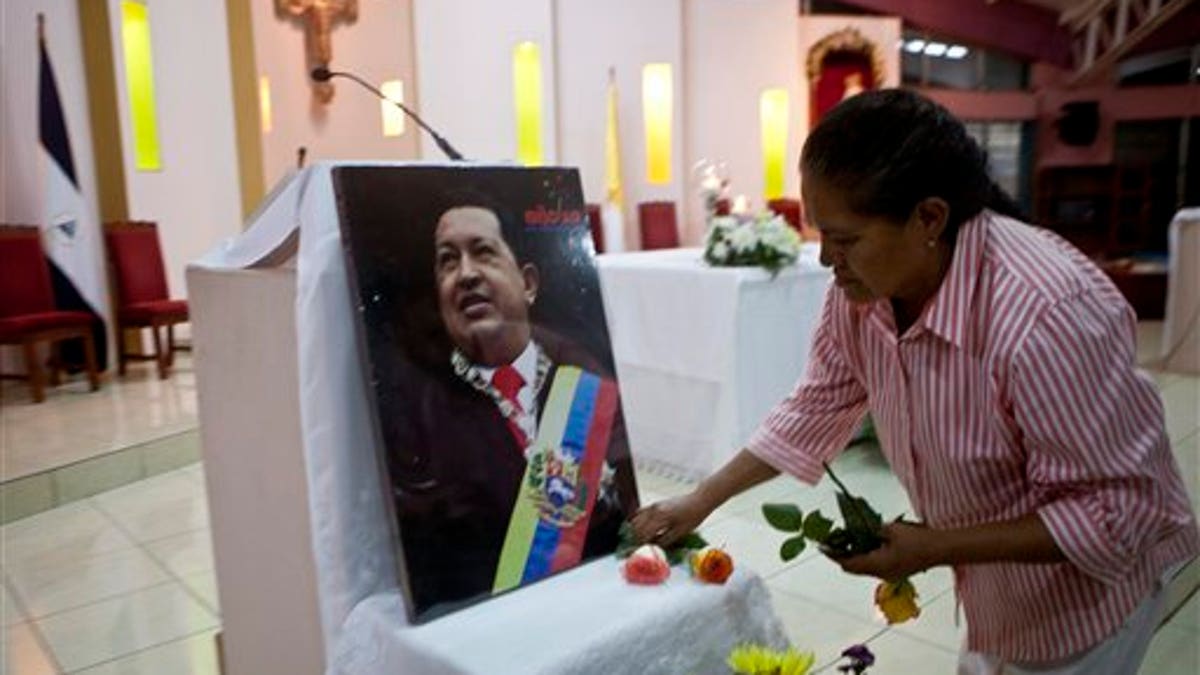
A woman places flowers in front of an image of Venezuela's President Hugo Chavez in preparation for a mass in support of him in Managua, Nicaragua, Wednesday Dec. 12, 2012. Venezuela's Information Minister Ernesto Villegas expressed hope about the Chavez's returning home for his Jan. 10 swearing-in for a new six-year term after his cancer surgery in Cuba, but said in a written message on a government website that if Chavez doesn't make it, "our people should be prepared to understand it." (AP Photo/Esteban Felix) (AP)
Venezuela’s Vice President Nicolás Maduro says the government is still aiming for President Hugo Chávez to be sworn in for a new term scheduled next month. He said Chávez's condition has been improving after his cancer surgery in Cuba.
This, a day after National Assembly President Diosdado Cabello floated the idea of postponing Chávez’s inauguration if necessary.
Maduro declined to speculate when asked about possible scenarios if the ailing 58-year-old is unable to take the oath of office on Jan. 10.
“We’re concentrating on prayer, on faith, on medical treatment that is among the best in the world, so that our commander in chief and president upholds his sacred duty on Jan. 10,” said Maduro at a news conference.
“Day after day…he has been getting better, and he’s the commander of a thousand victories, he’s the commander of miracles.”
Maduro, whom Chávez designated as his chosen successor before the surgery, also said that if Chávez isn’t able to be sworn in as planned, “he left clear, public instructions about any scenario.”
Chávez has not spoken publicly since his Dec. 11 surgery for pelvic cancer, and on Tuesday the government said he had a respiratory infection, though it was controlled. Chávez also suffered bleeding during the six-hour operation.
Cabello raised the idea of postponing the inauguration on Tuesday, stating it was simply his personal opinion.
“You can’t tie the will of the people to a date,” said Cabello in remarks published by the newspaper El Nacional. “My idea is that we can’t see the laws and the constitution from the restrictive point of view.”
The constitution says the president should be sworn in for a new term on Jan. 10. Cabello expressed hope that Chávez could still be back for his swearing-in.
But Venezuelan analyst Edgar Gutierrez said that Cabello appeared to be sending a message that it might take longer, and that he believes pushing back the date is an option.
Cabello noted the constitution also says that if a president is unable to be sworn in by the National Assembly, he may be sworn in by the Supreme Court. "And it doesn't put a date" for that, he said, noting that there is no mention of a date in the article dealing with a swearing-in before the Supreme Court.
Law professor Vicente Gonzalez de la Vega agreed with Cabello, saying the constitution allows for the swearing-in to be before the Supreme Court at a later date, which it doesn't specify.
"The only thing that ends Jan. 10 is the current (presidential) term," said Gonzalez, a professor at Central University of Venezuela.
Gonzalez said that lawmakers can request a medical report "to see whether he's getting better, whether he can come or not." And if not, he said, a transition process should then begin, including the calling of a new election.
If a president-elect dies or is declared incapacitated before the swearing-in, the constitution says the National Assembly president would temporarily take charge of the government and a new presidential vote would have to be held within 30 days. Chávez has said that if such a vote is held, his supporters should elect Maduro to take his place.
Former Supreme Court magistrate Roman Duque Corredor has ruled out the possibility of authorities going to Cuba for a swearing-in, saying a president cannot take the oath of office outside Venezuela.
Dr. Carlos Castro, scientific director of the Colombian League Against Cancer in Bogota, said much will depend on how Chávez's complications evolve.
"He still isn't out of danger, and he is still in what I'd call a critical phase in which anything can happen," said Castro.
Based on reporting by The Associated Press.
Follow us on twitter.com/foxnewslatino
Like us at facebook.com/foxnewslatino




